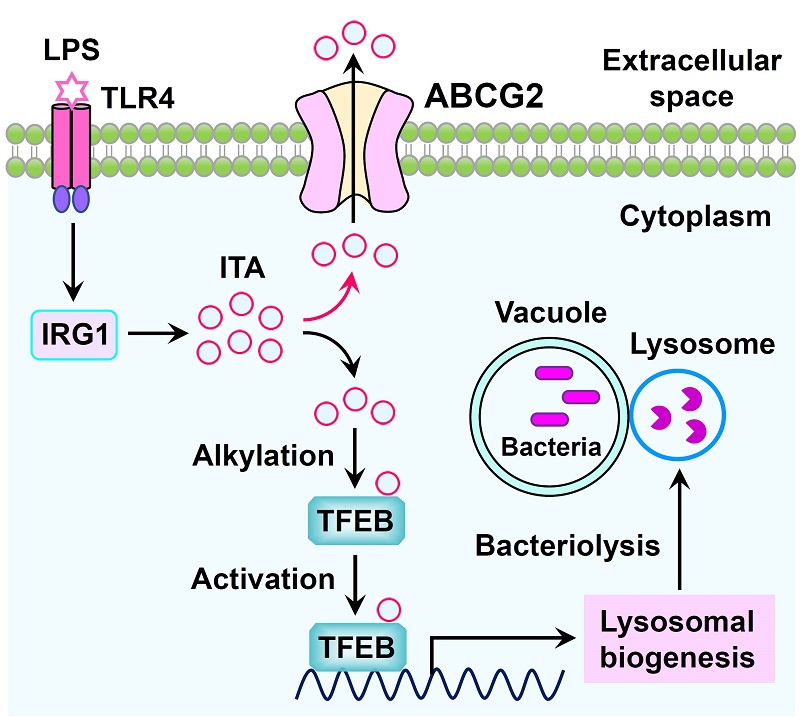ABCG2 is an itaconate exporter that limits antibacterial innate immunity by alleviating TFEB-dependent lysosomal biogenesis
Itaconate is synthesized from cis-aconitate by a mitochondrial enzyme immune-responsive gene 1 (IRG1), also known as cis-aconitate decarboxylase 1 (ACOD1). In mitochondria, itaconate is metabolized by succinyl coenzyme A synthetase (SCS) to produce itaconyl-CoA, and itaconyl-CoA is hydrated to citramalyl-CoA, which is cleaved into acetyl-CoA and pyruvate by citramalyl-CoA lyase (CLYBL).
The endogenous metabolite itaconate has recently emerged as an immunoregulator in classically activated macrophages. Owing to the electrophilic property of the α, β-unsaturated carboxylic acid group, itaconate can covalently modify aldolase A (ALDOA), gasdermin D (GSDMD), and transcription factor TFEB5 via a Michael addition-based mechanism, which contributes to its immunoregulatory effect in lipopolysaccharide (LPS)-stimulated macrophages. However, the mechanisms that macrophages regulate their intracellular itaconate levels during inflammatory responses have remained unclear.
Despite the itaconate metabolism pathway in mammals has been elucidated, it is still unknown how the negative charged itaconate exits the cells that produce it. Therefore, investigation of itaconate export mechanisms is imperative to understand the regulation of cell-intrinsic itaconate signaling in the context of inflammatory response, for example antibacterial innate immunity.
The family of human ATP-binding cassette (ABC) transporter contains 49 ABC genes that arranged in eight subfamilies. Many ABC transporters have been scrutinized because of their ability to move a broad spectrum of substrates from the cytosol to extracellular space or into membrane-bound intracellular compartments in an ATP hydrolysis-dependent manner. Here, we identify the ABC transporter ABCG2, also known as breast cancer resistance protein (BCRP), as a transporter that mediates direct and ATP hydrolysis-dependent itaconate export. We demonstrate that ABCG2-mediated itaconate export alleviates TFEB-dependent lysosomal biogenesis in inflammatory macrophages and subsequently limits antibacterial innate immunity in vitro and in vivo. These findings reveal a key molecular mechanism of itaconate export and characterize the role of this transport mechanism in antibacterial innate immunity (Figure 1).

Figure 1. It has been reported that itaconate is a lysosomal inducer that promotes antibacterial innate immunity. Here, Chen et al. reveal that ATP-binding cassette transporter G2 (ABCG2) is an itaconate exporter. ABCG2-mediated itaconate export limits antibacterial innate immunity by alleviating itaconate-induced TFEB activation and lysosomal biogenesis.
Article link: https://doi.org/10.1016/j.cmet.2023.12.015
Contact: LI Xinjian
Institute of Biophysics, Chinese Academy of Sciences
Beijing 100101, China
Email: lixinjian@ibp.ac.cn
(Reported by Prof. LI Xinjian's group)

